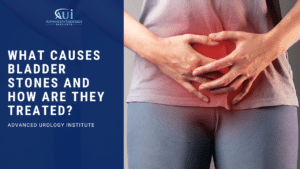What Causes Bladder Stones and How Are They Treated?
Key Takeaways:
- Bladder stones are hard masses of minerals that form in the bladder when minerals in concentrated urine crystallize.
- Causes of bladder stones include an imbalance in the pH or concentration of urine, not drinking enough fluids, urinary tract infections, certain medications, medical conditions, and prior urinary surgeries or obstructions.
- Early diagnosis and treatment is essential in the fight against bladder stone. Treatment options include increasing fluid intake, modifying diet, using medications, and high-end surgical procedures. Prevention involves eating a healthy diet, drinking lots of water, and keeping regular follow-ups and monitoring.
 Picture this: you’ve woken up in the middle of the night with a sharp, searing pain in your lower abdomen. It’s unrelenting, pushing you to seek immediate medical attention. You are quickly thrust into the world of urology where you bump into words like ‘bladder stones’. What on earth are these stones, you wonder? How did they form? And most importantly, can they be treated?
Picture this: you’ve woken up in the middle of the night with a sharp, searing pain in your lower abdomen. It’s unrelenting, pushing you to seek immediate medical attention. You are quickly thrust into the world of urology where you bump into words like ‘bladder stones’. What on earth are these stones, you wonder? How did they form? And most importantly, can they be treated?
Bladder stones, simply put, are hard masses of minerals that form in the bladder when minerals in concentrated urine crystallize. This may sound like an obscure, rare condition, yet it is surprisingly common. Over 4% of the world population develops bladder stone, a worrying statistic for such an uncomfortable, potentially life-altering condition.
Causes of Bladder Stones
Bladder stones don’t simply appear out of thin air; they have definite causes. An imbalance in the pH or concentration of your urine, due to factors such as diet and water consumption, can lead to stone formation. However, don’t rush to change your diet just yet. There are other causes to be aware of too.
Not drinking enough fluids, for instance, often leads to concentrated urine and subsequently, bladder stones. Urinary tract infections, certain medications, and some medical conditions may also put you on the path to stone formation. Prior urinary surgeries or obstructions can also create an environment conducive for bladder stones.
Symptoms and Diagnosis
So how do you know if you have bladder stone? Symptoms range from lower abdominal pain to blood in your urine. But these symptoms are also common to many other conditions. It’s like trying to find a needle in a haystack, isn’t it?
Fortunately, our urologists in FL have a variety of diagnostic tests at their disposal. These include urine tests, ultrasounds, CT scans, and X-rays, among others. Through a systematic process of exclusion and confirmation, these experts can accurately diagnose bladder stones.
Treatment Options for Bladder Stones
Getting diagnosed with bladder stones is not the end of the world, far from it actually, thanks to a series of treatment options available. Increasing your fluid intake and modifying your diet is a good starting point. Some medications can also dissolve or prevent the formation of stones.
However, when things get a bit too rocky, our urologists at the Advanced Urology Institute step in. The institute, which is the largest urology practice in Florida, specializes in high-end surgical procedures such as cystolitholapaxy, lithotripsy, and surgical removal. They’ve got you covered.
Prevention of Bladder Stones
They say prevention is better than cure, and this holds especially true for bladder stone. Some lifestyle modifications and preventive measures can go a long way. This includes eating a healthy diet, drinking lots of water, and keeping regular follow-ups and monitoring.
Conclusion
Bladder stones may seem like a mysterious, intimidating condition, but they are in fact quite manageable. As we’ve seen, they have specific causes and diagnosable symptoms. With the right diagnosis, they can be effectively treated, especially with the state-of-the-art surgical procedures provided by the Advanced Urology Institute.
Remember, early diagnosis and treatment are essential in the fight against bladder stone. If you are experiencing any symptoms related to bladder stones, do not hesitate to visit our expert urologists in FL. They are committed to your health, comfort, and wellbeing.
References:
- Bladder Problems | Advanced Urology Institute. (2023, June 7). Advanced Urology Institute. https://www.advancedurologyinstitute.com/conditions-we-treat/bladder-problems/
- Chronic UTI | Advanced Urology Institute. (2023, June 7). Advanced Urology Institute. https://www.advancedurologyinstitute.com/conditions-we-treat/chronic-uti/
- Advanced Urology Institute. (2023, August 21). What Are the Biggest Risk Factors for UTI? | Advanced Urology Institute. Advanced Urology Institute. https://www.advancedurologyinstitute.com/what-are-the-biggest-risk-factors-for-uti/
- Leslie, S. W., Sajjad, H., & Murphy, P. B. (2023, July 31). Bladder Stone. Nih.gov; StatPearls Publishing. https://www.ncbi.nlm.nih.gov/books/NBK441944/
- NHS Choices. (2023). Overview – Bladder stone. https://www.nhs.uk/conditions/bladder-stones/
- Imaging Tests to Check for Kidney Stones in the Emergency Department | Effective Health Care (EHC) Program. (2016). Ahrq.gov. https://effectivehealthcare.ahrq.gov/products/kidney-stone-imaging/consumer

